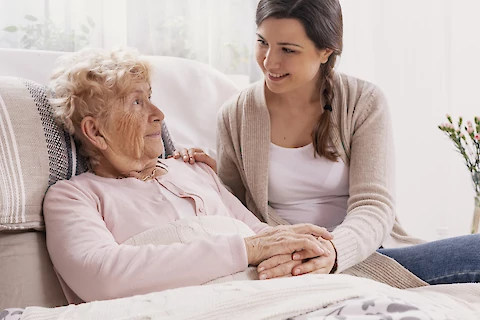
Are you living with a family member who has Alzheimer's disease? If so, you may have experienced or heard about "sundowning" – a term used to describe the confusion, agitation, and behavioral changes that often occur in the late afternoon and evening for those with Alzheimer's. Navigating the challenges of this can be tough, but understanding its triggers is key to making life more manageable for both you and your loved one.
This blog will explore the top sundowning triggers and share helpful tips on how to avoid or minimize their impact.
Top Triggers of Sundowning
There are a number of sundowning triggers that experts have noted. Here are four of the most common.
Fatigue
A consistent sleep schedule is crucial for seniors with Alzheimer's, as fatigue can exacerbate sundowning symptoms. Encourage a regular bedtime and wake-up time, and consider offering short naps during the day if your loved one appears tired.
Hunger or Dehydration
It's essential to provide regular meals and snacks to avoid hunger-induced agitation. Don't forget to encourage adequate fluid intake throughout the day, as dehydration can also contribute to sundowning symptoms.
Overstimulation
Loud noises and bright lights can be overwhelming for individuals with Alzheimer's, making it important to limit exposure to these stimuli. Focus on creating a calm and quiet environment during the evening hours to reduce the risk of sundowning episodes.
Disorientation
Confusion about the time, date, or location can trigger sundowning symptoms. To minimize this, maintain a consistent daily routine and provide visual cues, such as clocks and calendars, to help your loved one stay oriented.
Tips for Managing Sundowning Triggers
Now that you understand some sundowning triggers, let's go over some ways to manage these triggers. Understanding management techniques can help you and your senior loved one be more comfortable in the long term.
Establishing a Daily Routine
Creating a consistent daily routine that includes regular wake-up and bedtime, meals, and activities can help minimize sundowning episodes. This provides a sense of structure and familiarity, which can be comforting for seniors with Alzheimer's.
Creating a Calm And Soothing Environment
Reducing noise and clutter in the home can promote a sense of calm, helping to minimize sundowning symptoms. Consider incorporating soft lighting and relaxing scents, such as lavender, to create a soothing atmosphere in the evening.
Encouraging Physical Activity
Incorporating daily walks or light exercise can help reduce agitation and anxiety associated with sundowning. Be sure to choose activities that are appropriate for your loved one's abilities and preferences.
Offering Mental Stimulation
Engaging in cognitive activities, such as puzzles or games, can help maintain cognitive function and reduce sundowning symptoms. Additionally, providing opportunities for social interaction can help improve mood and overall well-being.
Promoting Relaxation And Stress Reduction
Practicing relaxation techniques, such as deep breathing or meditation, can help alleviate anxiety and stress associated with sundowning. Offering gentle massages or warm baths in the evening can also help promote relaxation and prepare your loved one for bedtime.
Seeking Professional Help
Recognize when additional support is needed and consult healthcare professionals about potential interventions. In-home care services or adult day programs can provide valuable support for seniors with Alzheimer's and their caregivers, helping to manage sundowning symptoms and improve their overall quality of life.
Senior Helpers Offers Support for Sundowning Episodes
Understanding and managing sundowning triggers is crucial for those living with a family member with Alzheimer's. By implementing the tips and strategies discussed above, you can help decrease the risk or severity of sundowning episodes and make life more manageable for both you and your loved one.
If you live in Oklahoma City, Edmond, or Norman and are seeking additional support for your senior loved one with Alzheimer's, contact Senior Helpers Greater OKC for compassionate and professional in-home care services.